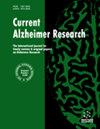Poloxamer-188 Exacerbates Brain Amyloidosis, Presynaptic Dystrophies, and Pathogenic Microglial Activation in 5XFAD Mice.
IF 1.9
4区 医学
Q3 CLINICAL NEUROLOGY
引用次数: 1
Abstract
BACKGROUND Alzheimer's disease (AD) is initiated by aberrant accumulation of amyloid beta (Aβ) protein in the brain parenchyma. The microenvironment surrounding amyloid plaques is characterized by the swelling of presynaptic terminals (dystrophic neurites) associated with lysosomal dysfunction, microtubule disruption and impaired axonal transport. Aβ-induced plasma membrane damage and calcium influx could be potential mechanisms underlying dystrophic neurite formation. OBJECTIVE We tested whether promoting membrane integrity by brain administration of a safe FDA approved surfactant molecule poloxamer-188 (P188) could attenuate AD pathology in vivo. METHODS Three-month-old 5XFAD male mice were administered several concentrations of P188 in the brain for 42 days with mini-osmotic pumps. After 42 days, mice were euthanized and assessed for amyloid pathology, dystrophic neurites, pathogenic microglia activation, tau phosphorylation and lysosomal / vesicular trafficking markers in the brain. RESULTS P188 was lethal at the highest concentration of 10mM. Lower concentrations of P188 (1.2, 12 and 120μM) were well tolerated. P188 increased brain Aβ burden, potentially through activation of the γ-secretase pathway. Dystrophic neurite pathology was exacerbated in P188 treated mice as indicated by increased LAMP1 accumulation around Aβ deposits. Pathogenic microglial activation was increased by P188. Total tau levels were decreased by P188. Lysosomal enzyme cathepsin D and calcium-dependent vesicular trafficking regulator synaptotagmin-7 (SYT7) were dysregulated upon P188 administration. CONCLUSION P188 brain delivery exacerbated amyloid pathology, dystrophic neurites and pathogenic microglial activation in 5XFAD mice. These effects correlated with lysosomal dysfunction and dysregulation of plasma membrane vesicular trafficking. P188 is not a promising therapeutic strategy against AD pathogenesis.在5XFAD小鼠中,poloxmer -188加重脑淀粉样变性、突触前营养不良和致病性小胶质细胞激活
背景:阿尔茨海默病(AD)是由脑实质中淀粉样蛋白(Aβ)的异常积累引起的。淀粉样斑块周围的微环境以突触前终末(营养不良的神经突)肿胀为特征,与溶酶体功能障碍、微管破坏和轴突运输受损有关。β诱导的质膜损伤和钙内流可能是营养不良神经突形成的潜在机制。目的:通过脑内给药,检测FDA批准的安全表面活性剂分子poloxmer -188 (P188)是否能在体内减轻AD病理。方法3月龄5XFAD雄性小鼠用微渗透泵给药42 d。42天后,对小鼠实施安乐死,并评估脑内淀粉样蛋白病理、营养不良的神经突、致病性小胶质细胞活化、tau磷酸化和溶酶体/囊泡运输标志物。结果最高浓度为10mM时,tsp188具有致死性。较低浓度的P188(1.2、12和120μM)耐受良好。P188增加脑Aβ负荷,可能通过激活γ-分泌酶途径。在P188处理的小鼠中,营养不良的神经突病理加剧,这表明在Aβ沉积物周围增加了LAMP1的积累。P188增加了致病性小胶质细胞的活性。总tau水平降低P188。溶酶体酶组织蛋白酶D和钙依赖性囊泡运输调节因子SYT7 (SYT7)在P188给药后失调。结论p188脑内递送加重了5XFAD小鼠的淀粉样蛋白病理、神经突营养不良和致病性小胶质细胞活化。这些影响与溶酶体功能障碍和质膜囊泡运输失调有关。P188不是一种很有希望的治疗AD发病机制的策略。
本文章由计算机程序翻译,如有差异,请以英文原文为准。
求助全文
约1分钟内获得全文
求助全文
来源期刊

Current Alzheimer research
医学-神经科学
CiteScore
4.00
自引率
4.80%
发文量
64
审稿时长
4-8 weeks
期刊介绍:
Current Alzheimer Research publishes peer-reviewed frontier review, research, drug clinical trial studies and letter articles on all areas of Alzheimer’s disease. This multidisciplinary journal will help in understanding the neurobiology, genetics, pathogenesis, and treatment strategies of Alzheimer’s disease. The journal publishes objective reviews written by experts and leaders actively engaged in research using cellular, molecular, and animal models. The journal also covers original articles on recent research in fast emerging areas of molecular diagnostics, brain imaging, drug development and discovery, and clinical aspects of Alzheimer’s disease. Manuscripts are encouraged that relate to the synergistic mechanism of Alzheimer''s disease with other dementia and neurodegenerative disorders. Book reviews, meeting reports and letters-to-the-editor are also published. The journal is essential reading for researchers, educators and physicians with interest in age-related dementia and Alzheimer’s disease. Current Alzheimer Research provides a comprehensive ''bird''s-eye view'' of the current state of Alzheimer''s research for neuroscientists, clinicians, health science planners, granting, caregivers and families of this devastating disease.
 求助内容:
求助内容: 应助结果提醒方式:
应助结果提醒方式:


